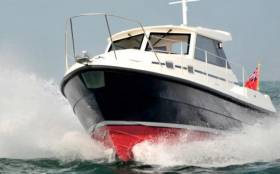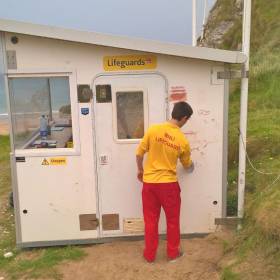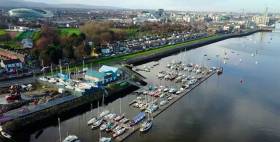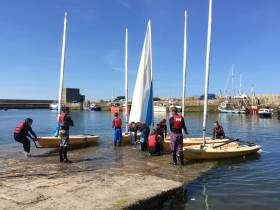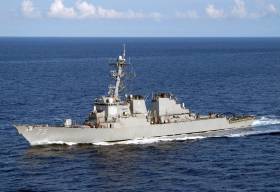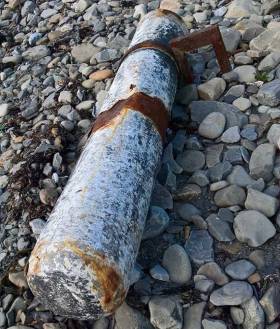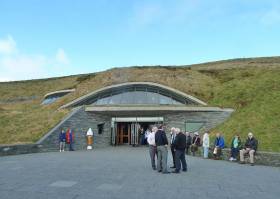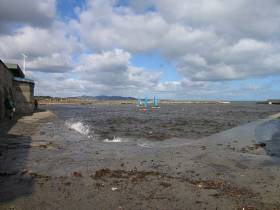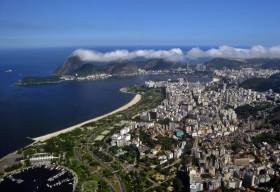Displaying items by tag: Crime
NI Police Investigate Alleged Assault During Recovery Of Destroyed Lough Neagh Patrol Boat
#LoughNeagh - The PSNI is investigating an alleged attack on three men as they recovered a destroyed fishing patrol boat from Lough Neagh last week, according to BelfastLive.
As previously reported on Afloat.ie, the patrol vessel belonging to the Lough Neagh Fishermen’s Co-Operative was burnt out in an arson attack by masked men in the early hours of Saturday 27 January, just weeks after it was delivered.
It’s now emerged that three men from the co-operative who attempted to retrieve the sunken pilot boat from the lough at Anneter were reportedly assaulted as they did so last Wednesday (31 January).
BelfastLive has more on the story HERE.
Vandals Damage Beach Lifeguard Unit On Causeway Coast
#Vandalism - Vandals have caused an estimated £800 (€900) worth of damage to an RNLI lifeguard unit at Whiterocks on the Causeway Coast.
Following two of the busiest days of the summer season so far in Northern Ireland, the RNLI team at Whiterocks arrived at work yesterday morning (Wednesday 19 July) to see that their unit, located near the entrance to the North Coast beach, had been extensively damaged.
The charity’s lifeguards discovered that the vandals had left behind broken bottles and a barbecue, while the unit’s aerial mount required for VHF communications had also been damaged.
A large rock which had been thrown at the hut damaged the unit’s outer skin, piercing the inner plywood and leaving a two-inch hole in the unit, which was also covered with indecent graffiti.
RNLI lifeguard supervisor Karl O’Neill said the damage to the aerial mount had threatened vital VHF communications, while the rock damage meant the unit was no longer watertight.
“Our lifeguards rely on the aerial to communicate with each other when on patrol and to communicate with their colleagues in the coastguard in the event of an emergency,” he said.
“Thankfully the damage has not rendered our communications off-service but should it have, and should it have happened during the last two days, which brought thousands of people to our beaches to enjoy the good weather, lives could have been put at risk.
“It is very disappointing for our lifeguards, who have been working hard to keep people safe, to turn up this morning after two busy days and see the unit they need to carry out their job has been so badly damaged. It really does dampen spirits.”
It is estimated that the repairs to the beach lifeguard unit will run into hundreds of pounds for the charity.
The RNLI is working closely with the PSNI who have appealed for anyone with any information to come forward.
“We would appeal to those doing this damage to be mindful that the RNLI is a charity,” said O’Neill. “Our lifeguards are an essential part of what is a seamless rescue service that saves lives from the beach to the open sea.
“Our lifeguards’ primary role at Whiterocks and on all lifeguarded beaches on the Causeway Coast is to make sure the beach can be enjoyed safely by the public. We want them to be able to continue to do that safely and with peace of mind.”
#Joyride - Two men appeared in court in Dublin yesterday (Thursday 1 June) over a boat chase on the River Liffey that surprised early morning commuters in the capital.
Brian Stacey and Ronan Stephens, both of Crumlin in south-west Dublin, face a number of charges relating to theft of a pleasure craft and boating under the influence of alcohol, according to The Irish Times.
Dun Laoghaire RNLI and the Dublin Fire Brigade were among the emergency services that responded to the incident around 6am yesterday after the €11,000 boat was taken from Poolbeg Yacht & Boat Club, which is preparing for this bank holiday weekend’s Dublin Riverfest.
The Irish Independent reports that a number of men on board the boat taunted those chasing them as they drove erratically through the Dublin Port shipping lanes east of the Eastlink Bridge, interfering with the passage of a cruise liner.
The boat was then pursued further up the Liffey, where it was finally halted at St John Rogerson’s Quay.
Both men arrested after the incident have been released on bail.
#Crime - A sail training boat owned by the Irish Youth Sailing Club is among those vandalised in an incident at Dun Laoghaire’s West Pier over the weekend, as TheJournal.ie reports.
The RIB, which was slashed and had its outboard engine removed, was one of three vessels damaged in the attack, the aftermath of which was discovered on Sunday morning (7 May).
Also affected were the Dun Laoghaire Sea Scouts, who lost an engine to theft, while a third engine was stolen from a yacht in the nearby inner harbour — the latest incident in what’s being described as a rise in thefts and vandalism in the area.
Kyron O’Gorman of the IYSC says a replacement training RIB could set the club back at least €7,000.
TheJournal.ie has more on the story HERE.
US Navy Sailor In Garda Custody Over Sexual Assault Claim
#Crime - A US naval officer is in Garda custody over an alleged sexual assault in a Dublin hotel, as Navy Times reports.
A spokesperson for the US Embassy confirmed that the alleged incident was reported on Wednesday 22 March while the USS Donald Cook, a destroyer based in southern Spain, was on a scheduled liberty visit to Cobh in Cork Harbour.
The sailor in question has not been charged and it is expected that the US will formally request Irish authorities to relinquish jurisdiction for the US Navy to pursue the matter internally.
Navy Times has more on the story HERE.
#BelfastLough - A sea captain has been convicted of being drunk on duty while piloting a merchant vessel in Belfast Lough last year.
As the Belfast Telegraph reports, Eugenijus Tulauskas was found to be nearly four times over the legal limit when he was arrested in September 2016 after a harbour pilot was forced to assist in control of the cargo ship.
Tulauskas, who has since lost his job, was fined £1,500 by a judge at Belfast Magistrates’ Court this week after initially contesting the charge, claiming he was not on duty at the time.
The Belfast Telegraph has more on the story HERE.
Major Drugs Find In ’Suspicious Item’ On Co Clare Beach
#CoastalNotes - A whopping 75kg of cocaine has been seized by the Revenue Commissioners from a torpedo-like capsule on a beach in Liscannor, Co Clare, as Independent.ie reports.
The “suspicious item” containing the drugs, thought to have a value of €5 million, is believed to have been attached below the waterline of a seagoing vessel — but it is not yet known where the drugs originated, nor their intended destination.
The drugs were found on Monday 24 October via a tip from the public through the Customs Drugs Watch Programme, which encourages coastal communities, maritime personnel and people living near airfields to report unusual or suspicious activity to Revenue via its confidential Freephone line 1800 295 295.
Daring Burglary At Cliffs Of Moher Visitor Centre
#CliffsOfMoher - As much as €20,000 in cash is believed to have been taken in a sophisticated burglary at the Cliffs of Moher Visitor Centre yesterday morning (Monday 3 October).
According to The Irish Times, the building’s security system was disabled after the daring thieves cut its electricity supply, allowing them unfettered access to the visitor centre at one of Ireland’s leading tourist attractions.
Visitors were yesterday warned away from the Co Clare coastal beauty spot while ESB Networks technicians worked to restore power.
The Irish Times has more on the story HERE.
Vigilance After Bray Harbour Engine Thefts
#BrayHarbour - Boat owners in Bray are urged to be vigilant after a number of engines were stolen from boats in the harbour last month.
The Wicklow Times reports that a number of boats moored in the harbour were apparently targeted by thieves who struck in the early hours of Monday 22 August.
A number of engines were taken in the brazen raid, as well as radio and GPS equipment.
"We know it happened at low tide when they would have had easy access," said Bray Sailing Club Commodore Mark Henderson.
"Unfortunately all our CCTV could pick up was flashlights as we know the robberies took place between 2 and 3am ... but it was too dark to make out faces."
Anyone in the market for a secondhand engine has been asked to check where it came from, and report any suspicions to the relevant authorities.
Crime Threat To Olympic Athletes As Rio Games Draw Near
#Rio2016 - “I don’t think the Irish media know how bad it is over here in Rio…” So Ireland’s Paralympian John Twomey emailed early this morning, as Afloat.ie's Tom MacSweeney writes.
He was reporting how “two good friends of mine who were in Kinsale for the Para Sailing Worlds in Kinsale in 2013” had been held up by two men, one of whom had a pistol, close to their hotel in Rio on Sunday morning. The Australian Sailing and Paralympic Committees have been told of the incident.
Liesl Tesch and team official Sarah Ross were confronted by two men while riding their bikes in a park near their hotel. One of the men was carrying a pistol and while both were threatened, the bikes were the only property stolen during the incident. Both members were unharmed, but shaken, and took part in racing at the 2016 Paralympic Games sailing venue later in the day.
“We were returning from a morning ride when the incident took place,” said Tesch. “We were close to our hotel when we were confronted by two men, one of whom was armed. I was threatened with the pistol and pushed to the ground.
“He took my bike, and the other perpetrator took Sarah’s bike. We are both shaken, but physically we’re both OK.”
Twomey commented: “These two ladies are good friends of mine and were in Kinsale for the Para Sailing Worlds in Kinsale in 2013. I don't think the Irish media know how bad it is over here in Rio. Perhaps you might keep people informed.”
Sailing teams and other athletes are gathering in Rio for final weeks of training and practice before the Olympics and Paralympics – and if they avoid any similar or even more serious brushes with criminal elements, they may be very lucky indeed.
The Sailing Anarchy website reports another incident when two Team GBR RIBs were stolen from Torben Grael’s Rio Yacht Club in Niteroi, which is reported to have been hit by stray bullets from a nearby gunfight in previous weeks.
Two British team coaches found the RIBs on a beach beach in Jurujuba, not far from the US team’s launching location.
Sailing Anarchy reports: “[The boats were found] as they were being stripped. Already VHFs, fuel hoses, tanks, and wiring were already gone, with outboards next to go. The GBR coaches immediate reaction was to threaten the thieves with calling the police. ‘You think that will help you?’ the head pirate said...
"One of the coaches surreptitiously snapped a pic of the pirates and the Rio Yacht Club staff identified one of them as a top drug dealer in the nearby Jurujuba favela, and told the coach he was very, very lucky.”



























